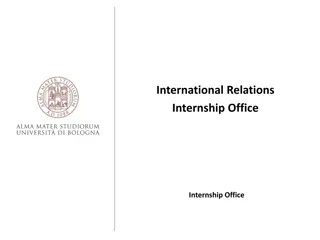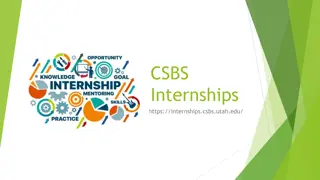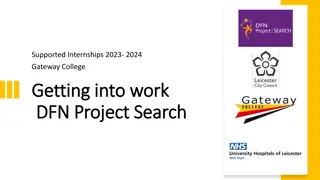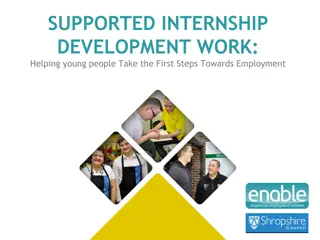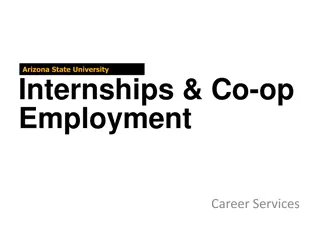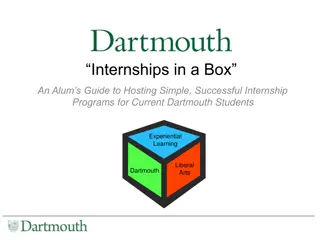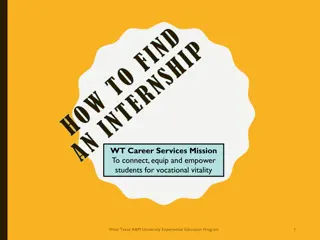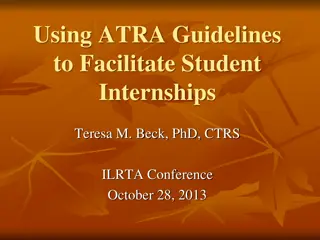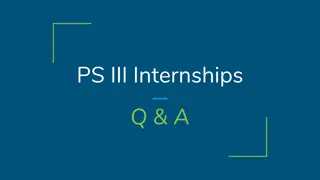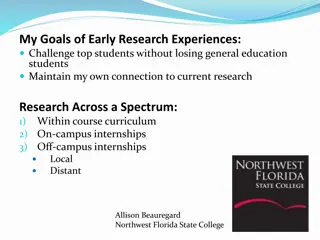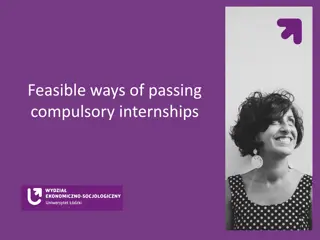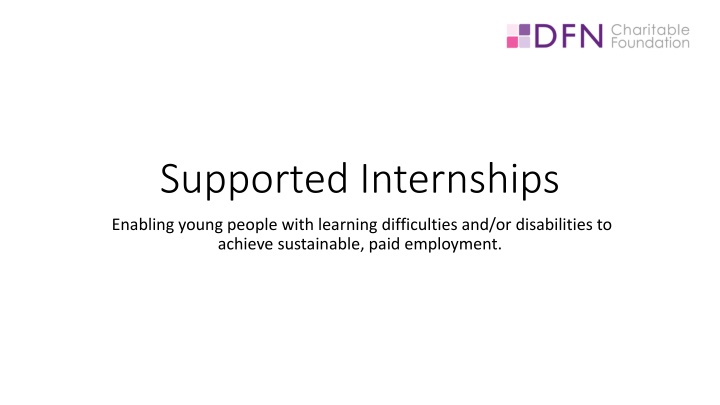
Unlocking Employment Opportunities: Supported Internships for Young People with Disabilities
Discover how Supported Internships empower young individuals with learning difficulties and disabilities to secure sustainable, paid employment opportunities. Learn about the structured study programmes, the importance of such initiatives, how they function, and what best practices entail.
Download Presentation

Please find below an Image/Link to download the presentation.
The content on the website is provided AS IS for your information and personal use only. It may not be sold, licensed, or shared on other websites without obtaining consent from the author. If you encounter any issues during the download, it is possible that the publisher has removed the file from their server.
You are allowed to download the files provided on this website for personal or commercial use, subject to the condition that they are used lawfully. All files are the property of their respective owners.
The content on the website is provided AS IS for your information and personal use only. It may not be sold, licensed, or shared on other websites without obtaining consent from the author.
E N D
Presentation Transcript
Supported Internships Enabling young people with learning difficulties and/or disabilities to achieve sustainable, paid employment.
What is a Supported Internship? A Supported Internship is a structured study programme based primarily at an employer. They enable young people aged 16-24 with an Education and Healthcare plan to achieve sustainable paid employment. They equip learners with the skills they need for work through learning in the workplace. Supported internships are unpaid and mostly last for one academic year. Wherever possible, they support the young person to move into competitive, integrated paid employment. Typically interns do three 10 week rotations in departments across the host business. Alongside their time at the employer, young people complete a personalised study programme, which includes the chance to study for relevant substantial qualifications, if appropriate, and English and Maths. https://www.preparingforadulthood.org.uk/downloads/supported-internships
Why are Supported Internships so important? Because less than 6% of adults with a learning disability known to their local authority in England are in paid work (NHS Digital 2018) despite more than 60% being willing and able to work! This is in comparison to 76% of people aged 16 to 64 in the general population in England who are in paid work (ONS 2019b). https://fi-fi.facebook.com/BBCNW/videos/supported- internship/491495038362706/
How they work All further education colleges, sixth form and independent specialist providers can offer supported internships as a study programme that is funded through the DfE. Supported Internship opportunities are usually offered in partnership with Local Authorities and Supported Employment organisations. Schools/colleges plan and deliver the curriculum element. Supported employment services partner with the school / college to offer on site job coaching. The host business works with education and supported employment services to plan on-site support and opportunities for the interns. There are a number of different Supported Internship models that can be used to underpin this programme of study.
What does Best Practice look like? Full time/5 days a week on site at a host business (800 hours). Full time teacher or tutor on site provided by the school/college. Full time job coach(es) on site provided by a local adult supported employment service. Individual career plan based on interests, skills and potential. Result in sustainable paid employment at the host business or other businesses the community. Interns take industry standard qualifications if appropriate. In work support identified and in place beyond the internship.
The role of the Job Coach Learn the business s culture and support the interns to integrate into that culture effectively. Learn the standard procedure for essential skills in each department that will host an intern and work with the tutor to plan a 10 week skill building internship. Provide individualised skill training and support to the interns at the host business using Training through Systematic Instruction (TSI) methodology. Reinforce class based learning and support interns to integrate into a job role by training them in all areas such as travel training, communication with co-workers, interview training, standards of hygiene and successful workplace behaviours. Support department managers and mentors to successfully include their intern. Work with families/carers, and appropriate agencies to effectively support the intern s whole life. Work with the departments, tutor and educational partner to review and improve intern performance. Participate/present at regular intern focused Employment Planning meetings / EHCP reviews and support the intern to succeed in long-term paid employment.
Why offer or guide someone towards a Supported Internship? The SEN Code of Practice states that FE colleges, sixth form colleges and 16-19 Academies must use their best endeavours to secure the special educational provision which young people need. Offering Supported Internships can help all learning providers to: Provide evidence that their provision is personalised and outcome-focused, in line with Ofsted expectations. Support more young people with learning difficulties and/or disabilities in their local area into paid work, in line with government policy. Offer a positive progression route to employment from their existing provision. Solve the issue of learner churn or revolving door syndrome . Show their commitment to equality and diversity. Demonstrate their responsiveness to the full range of learners in the local community.
A typical day for a Supported Intern.. 9:00 Employability Skills Curriculum 10:00 Worksite rotation (intern working in host department) 12:30 Lunch 1:15 Worksite rotation (intern working in host department) 3:30 Review, Plan , Debrief with teacher and job coach 4:00 Depart
Tracking Progress over time using Vocational Profiling and Job Development tools
Where to find out more Preparing for Adulthood website https://www.preparingforadulthood.org.uk/downloads/supported-internships. Ask your school, local college(s), Local Authority social worker(s), transition worker(s), or Job Centre Plus. Your local authority website provides information about what help there is to get a paid job https://www.gov.uk/find-local-council. Teach First post school success toolkit https://www.teachfirst.org.uk/sites/default/files/2020-02/Post-School Success Toolkit.pdf. UCAS Further Education advice https://www. ucas.com/further- education/apprenticeships-and- Success Toolkit.pdf. National SEND Employment Forum http://www.nsef.co.uk/. British Association for Supported Employment https://www.base-uk.org/. Engage To Change http://www.engagetochange.org.uk/.

